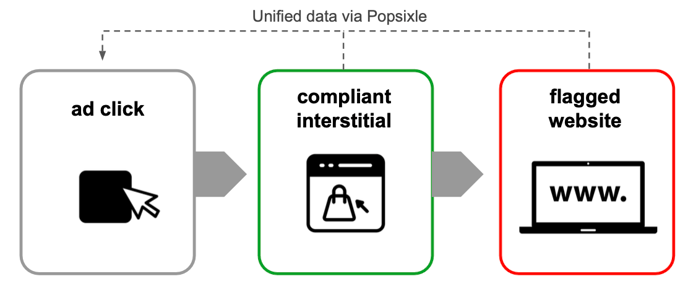If your Health & Wellness business was impacted by Meta's new privacy rules, Popsixle can help
In January 2025 Meta began enforcing data privacy policies that restrict data and block events for health & wellness categorized businesses, leading to disruptions in ad strategy for health-related advertisers.
If a site is flagged and categorized by Meta to be a "Health & Wellness Condition" site, key events (like “Purchase” events) can be blocked, which undermines an advertiser’s ability to run performance-driven ads and track conversions.
In response, the Popsixle team developed a range of features to solve for the disrupted data by re-categorizing the websites and successfully restoring blocked pixels.
In this article you’ll learn 1) how to check if your site has been affected and 2) the steps required to restore your data and get ad performance back on track
What sites are impacted?
Meta categorizes these types of sites as "Health & Wellness Condition":
- Websites associated with a Specific Condition
-
Example: A supplement site referencing “rosacea pills” or “arthritis relief” in URLs, product pages, or meta descriptions
-
- Websites associated with a Specific Health Status
-
Example: Store pages discussing “chronic migraines” or “cancer support.”
-
- Websites associated with Patients-Provider Relationships
-
Example: Telehealth services or platforms that facilitate direct patient-clinician consultations.
-
For example, a site selling supplements that treat rosacea may send ViewContent event URL data (e.g., "myvitamins . com/rosacea-pills") that Meta interprets as health-sensitive. Regulators see this as a potential privacy violation, implying that the site has disclosed the site visitor’s condition information to Meta, without permission.
Meta’s system monitors two main data sources for health-related triggers: the ad URL and the pixel/dataset event payloads.
1) Website Scraping - When you run ads linking to your site, Meta scans the page content for restricted health terms (e.g., “arthritis,” “cancer,” “menopause”). If restricted health terms are found, your domain may be flagged.
2) Pixel/Dataset Event Data - Standard or server-side CAPI events can include product names, URLs, or descriptions with health terms (Example: your event data might include an event source url like “myvitamins.com/rosacea-pills” or a product name like “Arthritis Relief Cream.”)
How to check if your business’s domain has been categorized for "Health & Wellness Condition":
If you believe your site your site was miscategorized, make sure to submit a re-review request through Meta’s interface
- Go to Meta Events Manager and navigate to your pixel/dataset
 Under Settings, find Manage Data Source Categories
Under Settings, find Manage Data Source Categories
- Look for a flag like “Health & Wellness Condition”
- Review Any Categorization
- If flagged, you may see terms like “level 1,” “level 2,” or “level 3” restrictions (see below)
The 3 Levels of Restrictions
Meta has three levels of restricting data if the system detects sent health data:
- Core Setup: ON
-
Normally brands can choose to turn this setting on, but Meta has it automatically turned on for health brands with no option to turn it off
-
- Mid/Lower Funnel Event Blocking
-
Meta may block mid- to lower-funnel events (like “AddToCart,” “Purchase”), limiting your ability to optimize for conversions.
-
-
Full Event Blocking
-
In some geographic regions like Europe, all events may be shut down entirely with no tracking or optimization data allowed beyond “reach"
-
How to solve it: Popsixle’s health compliance features
Popsixle's health compliance features help brands restore or maintain compliant status on Meta while preserving essential tracking.
- Back-Up Custom Events
- Sends additional “custom” events in case standard events get blocked (e.g
 ., “Purchase” → “Custom_P”)
., “Purchase” → “Custom_P”) - Ensures that ads still receive critical data, even if Meta disables standard events
- Sends additional “custom” events in case standard events get blocked (e.g
-
- Important note! Once you've enabled Popsixle's Back-Up Custom events, you'll need to verify all Popsixle events in Meta Events Manager and update your settings to ensure your pixel is not blocking Popsixle's events. Click here for the guide.
-
Obscured Domain (Domain Override)
- Replaces the site's real domain with a user-defined domain when sending data to Meta (this is ideal for domain names that include restricted terms or triggers)
-
Keyword Blacklist & Cleansing
- Auto-removal of flagged terms (e.g., “arthritis,” “cancer”) in event payloads, which prevents Meta from seeing restricted keywords in your data
-
Compliant Interstitial Pages
- If removing health-related terms is not possible your site, we’ll help you build a landing page that filters out restricted text while unifying events across both sites
- This solution maintains a path to your main site without exposing sensitive terms to Meta
The two paths toward compliance:
Most brands should try to make these changes to their website to improve compliance:

- Remove/Modify Health Keywords: Clean up your copy, product titles, URLs.
- Strip/Obscure Terms in Pixel Data: Use Popsixle’s Keyword Blacklist & Cleansing
-
Override Domain if needed to avoid immediate re-flags
- Build a separate domain with zero mention of specific health terms

-
Drive traffic from ads → interstitial → main site.
-
Ensure data is unified across both sites via Popsixle’s single code snippet
To get started:
- Audit Your Site & Pixel - Identify any URLs, product descriptions, or event payloads containing restricted terms.
-
Choose Your Strategy - Decide if you’ll remove keywords, build an interstitial, override your domain, or a combination
-
Implement Popsixle - Turn on the health compliance features in the Popsixle App to protect your tracking and remain compliant (if Popsixle is not yet installed for your site, click here to install the Popsixle App)
Stay updated with Popsixle!
Meta’s policies evolve, but the Popsixle team can help you adapt with minimal disruption.
If you have questions or need support working through the steps above, send an email to success@popsixle.com to get help.
